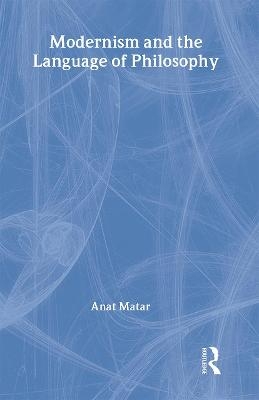
Modernism and the Language of Philosophy
Seiten
2006
Routledge (Verlag)
978-0-415-35379-3 (ISBN)
Routledge (Verlag)
978-0-415-35379-3 (ISBN)
- Titel ist leider vergriffen;
keine Neuauflage - Artikel merken
Discusses how Modernists shared the belief that the kind of truth "sub specie aeterni" was sought by philosophers was meaningless or was expressed by literature and poetry, and addresses the challenge this belief presented to philosophy. This book argues the modernist assumption rests upon unacknowledged, or denied dogmas or tacit images.
Modernism can be characterised by the acute attention it gives to language, to its potential and its limitations. Philosophers, artists and literary critics working in the first third of the twentieth century emphasized language’s creative potential, but also stressed its inability to express meaning completely and accurately. In particular, modernists shared the belief that the kind of truth sub specie aeterni that was sought by philosophers was either meaningless or was more appropriately expressed by the arts – especially by literature and poetry. Modernism and the Language of Philosophy addresses the challenge this belief presented to philosophy, and argues that the modernist assumption rests upon a host of unacknowledged, repressed or denied dogmas or tacit images.
Drawing in particular upon the work of Michale Dummett and Jacques Derrida, this book explores a new solution to this crisis in philosophical language, and it is these two philosophers who drive the narrative of the book and offer perspectives through which both past and present day philosophers are examined.
Modernism can be characterised by the acute attention it gives to language, to its potential and its limitations. Philosophers, artists and literary critics working in the first third of the twentieth century emphasized language’s creative potential, but also stressed its inability to express meaning completely and accurately. In particular, modernists shared the belief that the kind of truth sub specie aeterni that was sought by philosophers was either meaningless or was more appropriately expressed by the arts – especially by literature and poetry. Modernism and the Language of Philosophy addresses the challenge this belief presented to philosophy, and argues that the modernist assumption rests upon a host of unacknowledged, repressed or denied dogmas or tacit images.
Drawing in particular upon the work of Michale Dummett and Jacques Derrida, this book explores a new solution to this crisis in philosophical language, and it is these two philosophers who drive the narrative of the book and offer perspectives through which both past and present day philosophers are examined.
Anat Matar is a senior lecturer at Tel-Aviv University, Israel.
Preface List of Abbreviations Introduction: Two Genealogies of Modernism Part 1. Acting, Not Speaking: Three Moments of Modernism Part 2. Pre-Modernism: The Right Turn that Went Wrong Epilogue: Words and Dogmas Notes Bibliography Name Index
| Erscheint lt. Verlag | 18.1.2006 |
|---|---|
| Reihe/Serie | Routledge Studies in Twentieth-Century Philosophy |
| Verlagsort | London |
| Sprache | englisch |
| Maße | 156 x 234 mm |
| Gewicht | 474 g |
| Themenwelt | Geisteswissenschaften ► Philosophie ► Philosophie der Neuzeit |
| Geisteswissenschaften ► Philosophie ► Sprachphilosophie | |
| ISBN-10 | 0-415-35379-3 / 0415353793 |
| ISBN-13 | 978-0-415-35379-3 / 9780415353793 |
| Zustand | Neuware |
| Haben Sie eine Frage zum Produkt? |
Mehr entdecken
aus dem Bereich
aus dem Bereich


